 Petzlover
Petzlover Austrian Black and Tan Hound is originated from Austria but Gaddi Kutta is originated from India. Austrian Black and Tan Hound may grow 15 cm / 5 inches shorter than Gaddi Kutta. Austrian Black and Tan Hound may weigh 14 kg / 30 pounds lesser than Gaddi Kutta. Both Austrian Black and Tan Hound and Gaddi Kutta has same life span. Austrian Black and Tan Hound may have less litter size than Gaddi Kutta. Both Austrian Black and Tan Hound and Gaddi Kutta requires High Maintenance.
Austrian Black and Tan Hound is originated from Austria but Gaddi Kutta is originated from India. Austrian Black and Tan Hound may grow 15 cm / 5 inches shorter than Gaddi Kutta. Austrian Black and Tan Hound may weigh 14 kg / 30 pounds lesser than Gaddi Kutta. Both Austrian Black and Tan Hound and Gaddi Kutta has same life span. Austrian Black and Tan Hound may have less litter size than Gaddi Kutta. Both Austrian Black and Tan Hound and Gaddi Kutta requires High Maintenance.
 When Celts began settling in Western Europe, they brought their dogs along. The Celtic Hounds had a duty to hunt, guard and fight in battles. They were, most likely, the ancestors of breeds like Greyhounds and Irish Wolfhounds. The original Austrian black and tan hound was created in Austria during the late nineteenth century. They were very specific dog breed because of their sharp nose, agility, speed, trainability and extraordinary persistence while hunting or tracking.
When Celts began settling in Western Europe, they brought their dogs along. The Celtic Hounds had a duty to hunt, guard and fight in battles. They were, most likely, the ancestors of breeds like Greyhounds and Irish Wolfhounds. The original Austrian black and tan hound was created in Austria during the late nineteenth century. They were very specific dog breed because of their sharp nose, agility, speed, trainability and extraordinary persistence while hunting or tracking.
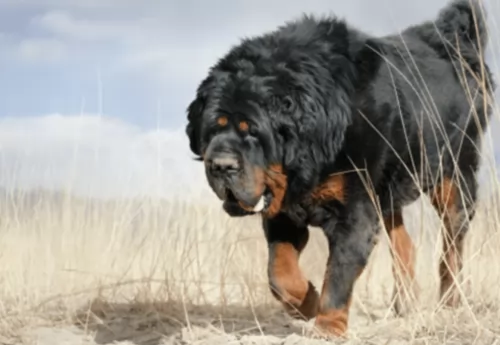 The Gaddi Kutta is mountain dog of the mastiff line from northern India. They are mostly found in the western Himalayas and Himachal Pradesh. It is also seen in Nepal and often named the Indian Panther Hound and the Mahidant Mastiff. They were bred to hunt but because of their strength and intelligence they are used to guard and herd goats and sheep. They are strong enough to defeat or scare off a panther or snow leopard and intelligent enough to work independently in finding strays and bringing them back to their pens. They have been known to protect herds of cattle from bears and leopards.3 or 4 of them working together can handle the guard duties for thousands of cattle.
The Gaddi Kutta is mountain dog of the mastiff line from northern India. They are mostly found in the western Himalayas and Himachal Pradesh. It is also seen in Nepal and often named the Indian Panther Hound and the Mahidant Mastiff. They were bred to hunt but because of their strength and intelligence they are used to guard and herd goats and sheep. They are strong enough to defeat or scare off a panther or snow leopard and intelligent enough to work independently in finding strays and bringing them back to their pens. They have been known to protect herds of cattle from bears and leopards.3 or 4 of them working together can handle the guard duties for thousands of cattle.
Their reputation precedes them – as ferocious and courageous, unmatched in their instincts to protect what is theirs. In the line of the Mastiffs and Molosser, the Gaddi is powerful and agile, and considered to be of ancient heritage though no one is sure what their origin is. The local myth is that dogs were crossed with tigers. It is more likely that dingo-like wild hounds from the Himalaya were crossed with the Tibetan Mastiff to create the Gaddi Kutti. Also found in Pakistan, most lines of the breed have been crossed with others including the German Shepard and the Bully Kutta. Outside of the Himalayas there are not many if any pure lines. The Gaddi Kutta is a good family dog if you socialize him as a puppy. He will be gentle, calm and intuitive with his family, but aggressive toward strangers and other dogs.
 The Austrian black and tan hound is one of the larger dog breeds. The coat colour of this breed is unique: the coat must be black with small and defined fawn markings. The body, head and legs are black, with dark or fawn markings with the fawn marks above the eyes.
The Austrian black and tan hound is one of the larger dog breeds. The coat colour of this breed is unique: the coat must be black with small and defined fawn markings. The body, head and legs are black, with dark or fawn markings with the fawn marks above the eyes.
The Black and Tan is a smooth coated, slim breed with the broad chest and a wide skull shape. Their teeth meet in a scissor bite. They don’t have very long ears and their tail is long and slightly bent.
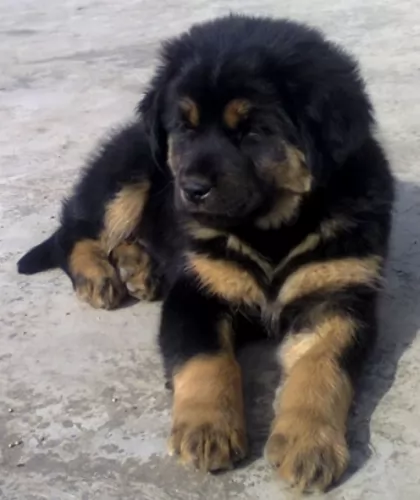 The Gaddi Kutta is a mastiff but he is athletic, has tremendous speed and stamina. He is muscular and deep-chested, leaner than most of the mastiff lines. Their ears can be either natural or cropped, on a very large head. One of the most important traits of the Gaddi Kutta is the massive, arched neck that protects them from predators. He is sturdy with a heavily feathered, thick tail curling over the back.
The Gaddi Kutta is a mastiff but he is athletic, has tremendous speed and stamina. He is muscular and deep-chested, leaner than most of the mastiff lines. Their ears can be either natural or cropped, on a very large head. One of the most important traits of the Gaddi Kutta is the massive, arched neck that protects them from predators. He is sturdy with a heavily feathered, thick tail curling over the back.
They are massive, wolf like dogs, fiery and huge but intelligent and faithful to their people. They are scary even when they are trying to be affectionate. The muzzle is strong, and the mane is thick. The Gaddi has long, heavy legs and very large feet that are feathered, making him even more intimidating.
There are two types of Gaddi Kutti – the longhaired and the shorthaired. The longhaired is the most common and has a fuller coat with long feathering on the tail, legs and chest and some feathering on the feet. They are all usually solid colors of yellow, fawn and cream or they could be piebald, brown or brindle. They have a woolly dense undercoat.
 The Austrian Black and Tan Hound get along well with strangers, other dogs or any animals. If they are not trained, their instinct to hunt will be a problem for other, smaller dogs and small animals. This is why this breed can’t be a guard dog. He is usually very friendly, and he remains friendly in most situations. It is very easy to train and socialize them, but you must remain firm while teaching them right from wrong. They are not the breed for the indoor, apartments or senior citizens. If you are not able to fulfil his daily need for activity, he can become quite destructive.
The Austrian Black and Tan Hound get along well with strangers, other dogs or any animals. If they are not trained, their instinct to hunt will be a problem for other, smaller dogs and small animals. This is why this breed can’t be a guard dog. He is usually very friendly, and he remains friendly in most situations. It is very easy to train and socialize them, but you must remain firm while teaching them right from wrong. They are not the breed for the indoor, apartments or senior citizens. If you are not able to fulfil his daily need for activity, he can become quite destructive.
Nonexistent for the last 30 years. But, if the dog gets mistreated, neglected or threatened – this breed knows to be aggressive. But, if you are a good and loving owner who makes sure that your dog is well raised, fed, loved, trained and socialized while he is still a pup, you will have no reason for the fear.
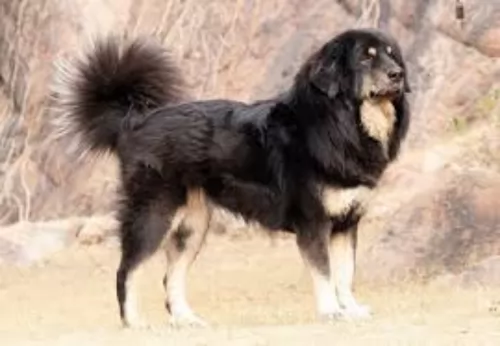 They are not always great with children, but they will protect own children in their family. Do not leave unattended.
They are not always great with children, but they will protect own children in their family. Do not leave unattended.
They have the ability to bring down a wolf or even a bear or snow leopard.
Because of his size, temperament and coat he is not very adaptable. He is good outside in a colder region and with a lot of land to roam, but not in a hot region or in an apartment.
This breed is very smart, learns quickly on his own.
 (hip or elbow joint malformation) can happen from injury or overuse of the joints since the Austrian black and tan hound is a runner and jumper.
(hip or elbow joint malformation) can happen from injury or overuse of the joints since the Austrian black and tan hound is a runner and jumper.
They have sensitive ears and they can suffer from ear infections. To avoid this, you must have regular vet checks and have a habit of regular cleaning - hygiene of their ears.
Caused by Demodex canis. If you notice hair loss, redness and scaling you must take your pet to the vet urgently since this disease can be transmitted humans.
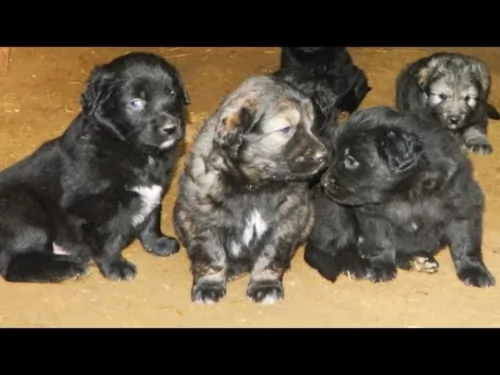 The breed is prone to obesity if they do not get enough exercise or a decent diet.
The breed is prone to obesity if they do not get enough exercise or a decent diet.
 Austrian Black and Tan Hounds don’t eat a lot even if you might think that they do. The truth is that they won’t need more than the prescribed portions that can be found in the instructions of high-quality dry dog food per day. All you have to do is make sure they have 3 meals during the day until they are 6 months old, and later they can settle for two meals per day.
Austrian Black and Tan Hounds don’t eat a lot even if you might think that they do. The truth is that they won’t need more than the prescribed portions that can be found in the instructions of high-quality dry dog food per day. All you have to do is make sure they have 3 meals during the day until they are 6 months old, and later they can settle for two meals per day.
Don’t give them the freedom to eat as much as they want. That can cause serious health complications. Their stomachs won’t be able to digest human food because it is usually made with a lot of spices. You can feed them with treats like eggs, fresh cheese, fruits and vegetables are okay as treats but only if these treats make less than 10% of their daily portion.
This playful dog needs the daily dose of outside activities. The grooming is easy but it must be regular. Once-a-week brushing at least is necessary. They don’t need to be bathed regularly but you must check their skin conditions daily since they have high risks of skin diseases. Nails need to be trimmed since they grow too fast and ears need to be cleaned every day to avoid ear infections.
The Austrian Black and Tan Hound are like any hound: they have an excellent sense of smell and they love to explore. They like to run and they can run for miles. Any outside activity will be a good choice. They like to bark and they bark even when they are happy. They are usually friendly towards strangers and other dogs, so the dog park is a good choice as well. They will love being at playgrounds as well since they love children and they can be a great Frisbee partner.
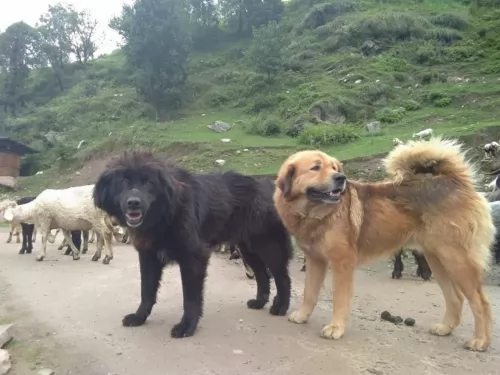 Should feed a high quality dry puppy food for large dogs. Give 1-2 cups per day split into 2-3 meals.
Should feed a high quality dry puppy food for large dogs. Give 1-2 cups per day split into 2-3 meals.
Again you want to feed high quality dry adult dog food for large dogs. Give 3-4 cups per day split into 2 meals. Watch for obesity and if your Gaddi Kutta is gaining too much weight, cut back.
The Gaddi Kutti seems to be immune to the most common of canine diseases.
This is a breed of very large dogs that need daily exercise by walking and running. However, since they have been fairly isolated in India and the Himalayas, he has not been exposed to organized dog play and exercise such as agility, dock jumping or field trials. He would probably succeed at all three.